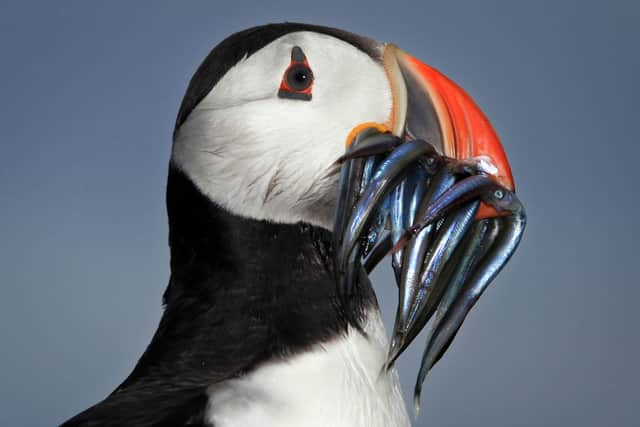Sandeel fisheries closure: Defra calls time on controversial industry - as seabird supporters celebrate
and live on Freeview channel 276
The government has vowed to end industrial sandeel fishing in English waters, a move conservationists say will be a "game changer" for saving the UK's globally important seabird colonies.
Sandeels - small, eel-like fish which typically live in vast shoals - are a vital food source for some of the UK's most vulnerable seabirds and marine mammals, like puffin, kittiwakes, and harbour porpoises, as well as commercially important fish species like haddock and whiting. North Sea fishermen have previously had a catch quota of 5,773 tonnes of the tiny fish each year, although sandeel fishing has been paused for the past three years to lessen pressures on the wider marine environment.
Advertisement
Hide AdAdvertisement
Hide AdBut this week, Defra - the government's Department for Environment, Food & Rural Affairs - announced sandeel fisheries in English waters of the North Sea will permanently close by April. They also announced a score of other initiatives one year on from the launch of the Environmental Improvement Plan, including targeted restrictions on damaging bottom trawling in 13 more protected areas - to help protect pink sea fans, fragile sponges, and anemones from destruction.


Environment Secretary Steve Barclay said: “We’ve made a lot of progress since we launched the Environmental Improvement Plan – we’ve planted nearly 5 million trees, improved public access to our beautiful countryside and accelerated the adoption of our world-leading farming schemes.
“We are building on this progress with a new package to safeguard our marine ecosystems and bring us one step closer to achieving our '30 by 30' target, both on land and sea." This is the government's commitment to protect at least 30% of the UK's land and sea for nature, by 2030.
“Protecting the environment is fundamental to the prosperity of our country," Barclay added. "Our new commitments will drive forward our mission to create a cleaner and greener country for all.”
Advertisement
Hide AdAdvertisement
Hide AdBeccy Speight, chief executive of the Royal Society for the Protection of Birds (RSPB), said the conservation charity had been calling for an end to industrial sandeel fishing for some time. "Today’s announcement is a vital lifeline from our Government for our seabirds when they need it most," she said.
The UK is home to globally important seabird colonies, but the RSPB said these populations were at the forefront of the nature and climate emergency, with many in significant decline - their resilience being pushed to the limit. They face many environmental pressures, but last year also saw thousands of seabirds wiped out by a bird flu epidemic, with 21 of the UK’s 25 breeding seabird species testing positive for the virus.
“To support the recovery of our seabirds, the RSPB has long recommended an end to industrial sandeel fishing in UK waters, to secure vital food sources for these amazing birds. A call that has been passionately backed by tens of thousands of our members and supporters when Defra launched a public consultation on the issue," Ms Speight continued.
"Halting wildlife decline and putting nature on the path to recovery must be supported by a programme of government actions, and today’s announcement represents one of those jigsaw pieces - along with demonstrating that overwhelmingly the public supports these actions that enable nature’s recovery.”
Advertisement
Hide AdAdvertisement
Hide AdSandeel are not true eels, and the name actually encompasses a range of similar fish species living in seas across Europe. Many caught are ground up and used for fishmeal, often used as feed for pigs and poultry - which is also not without controversy.
Comment Guidelines
National World encourages reader discussion on our stories. User feedback, insights and back-and-forth exchanges add a rich layer of context to reporting. Please review our Community Guidelines before commenting.
